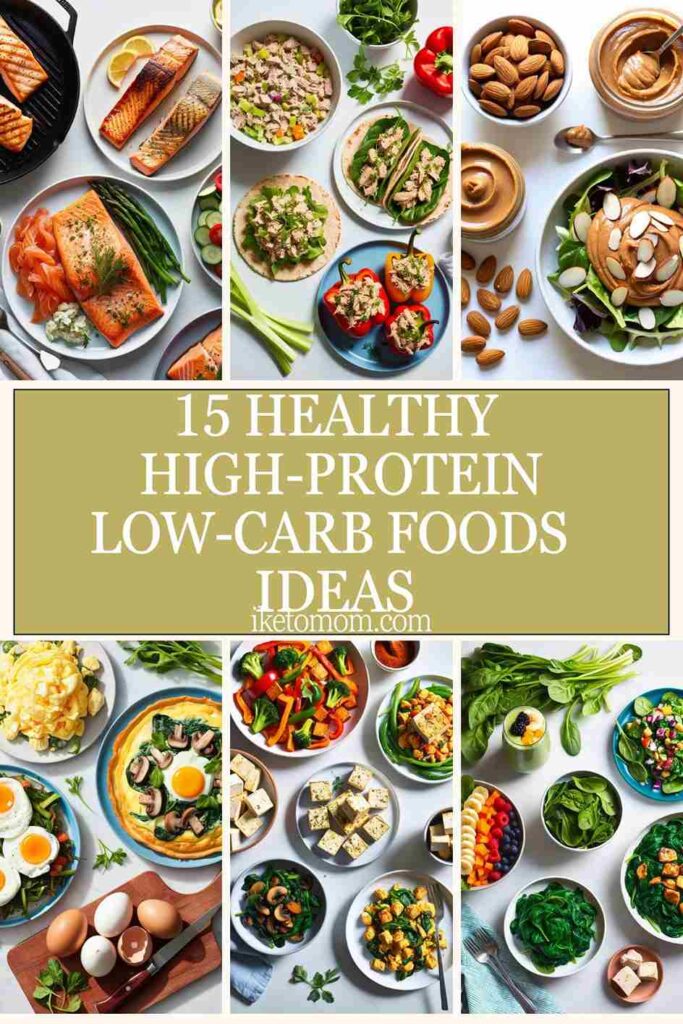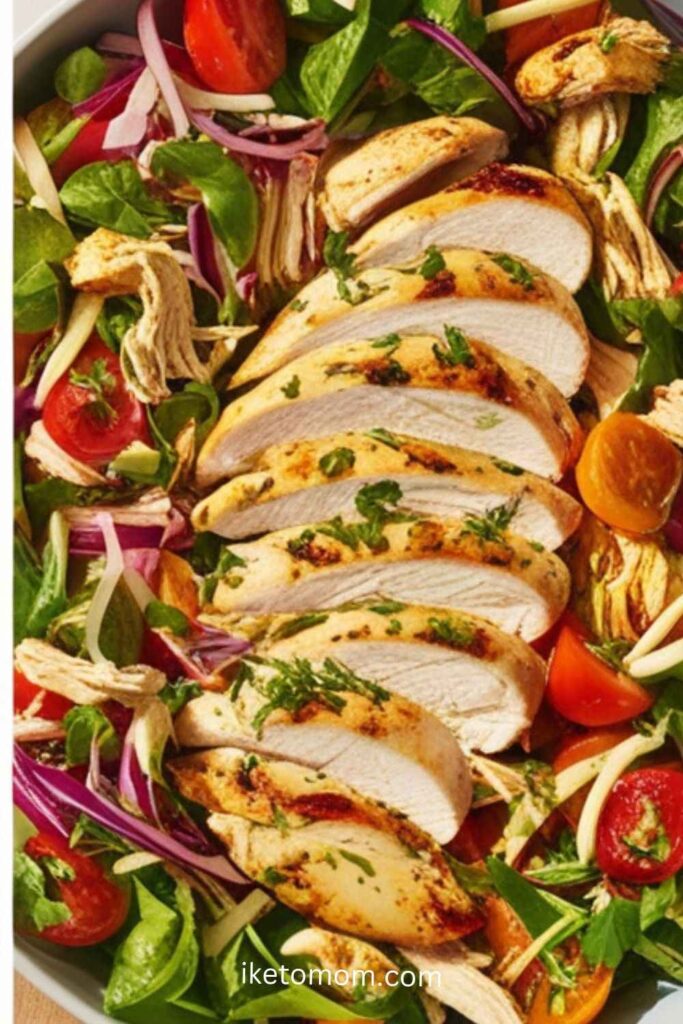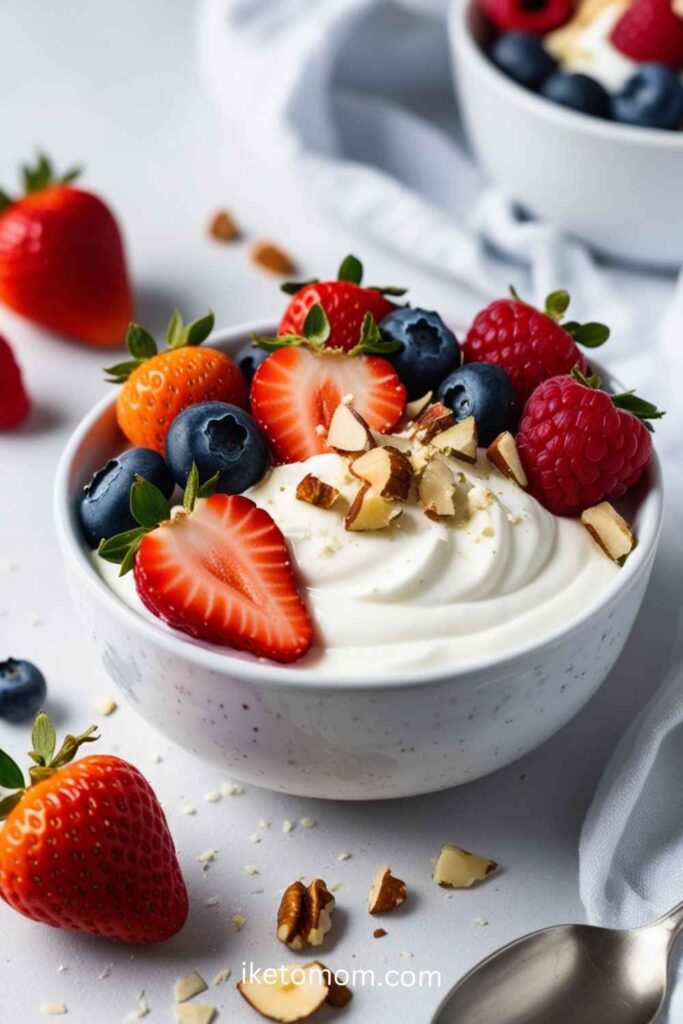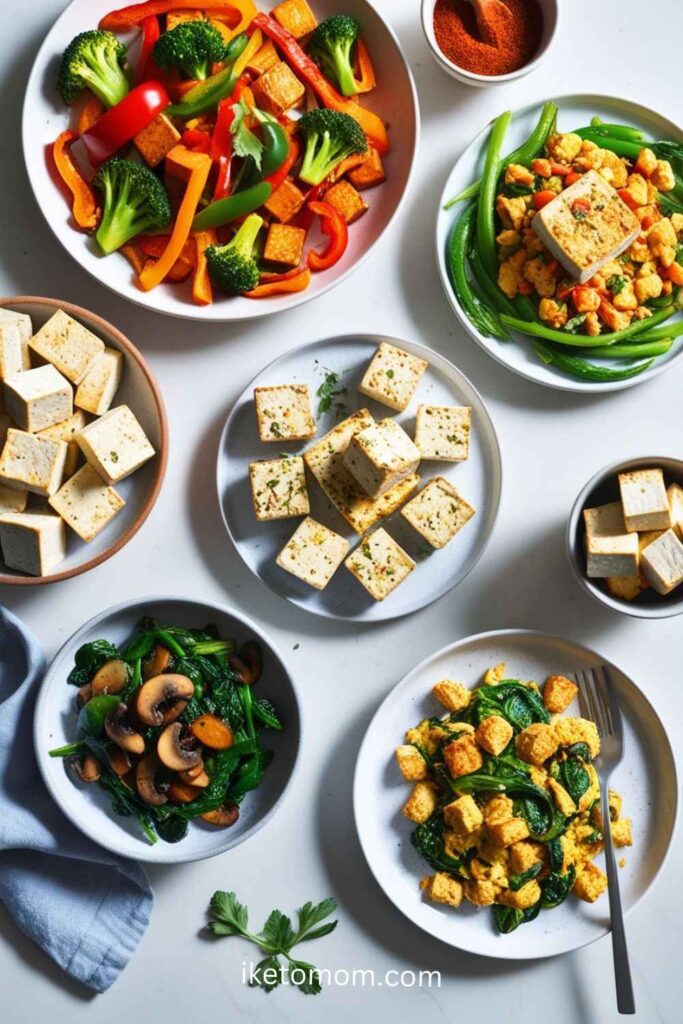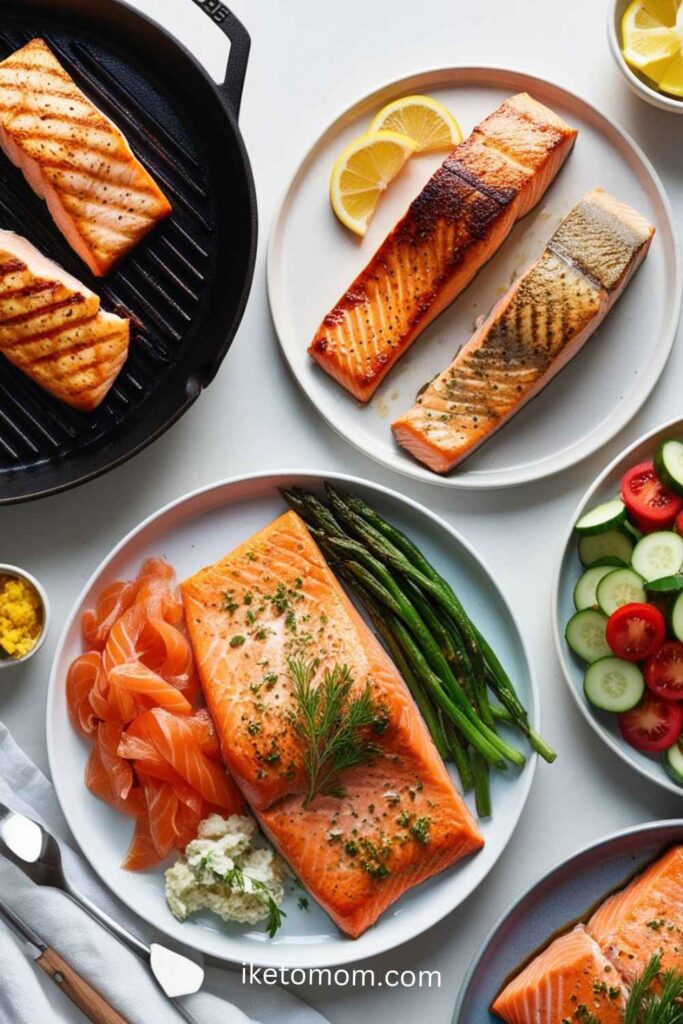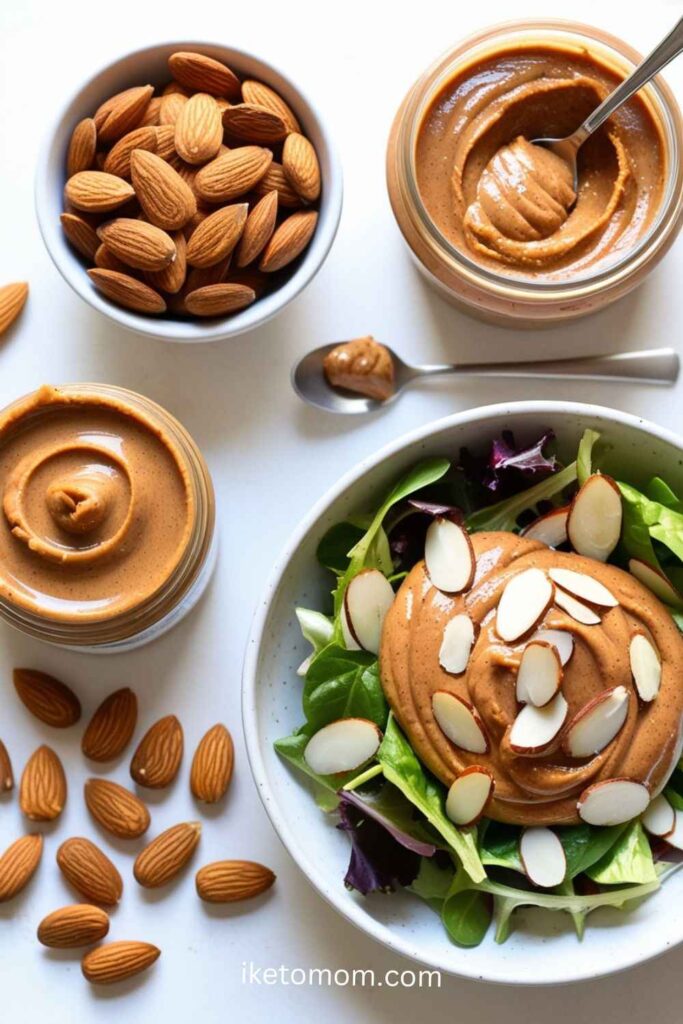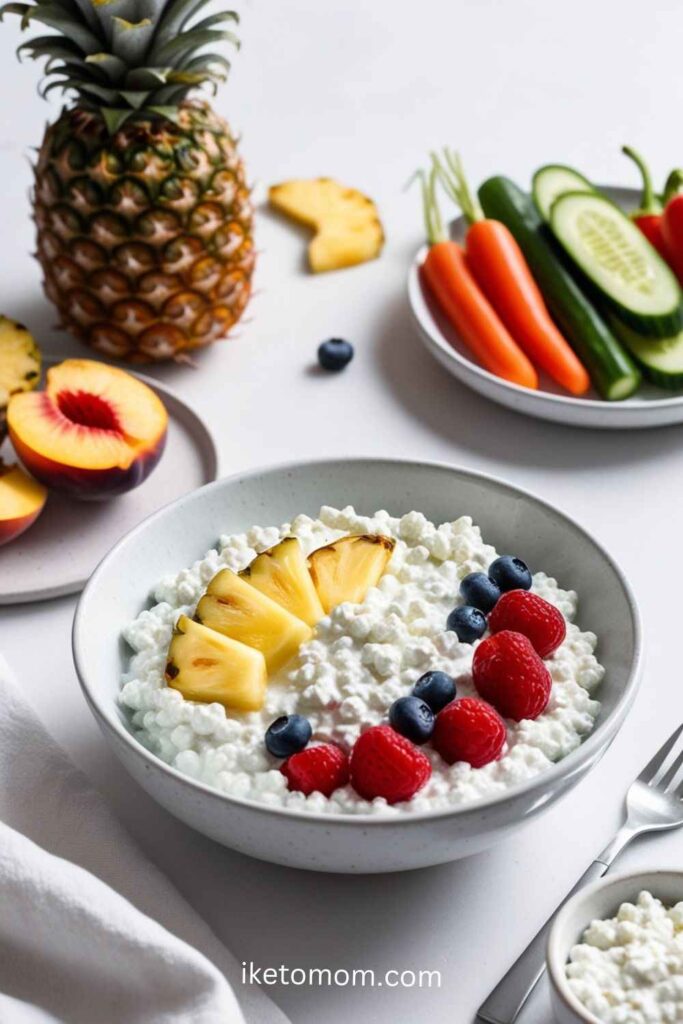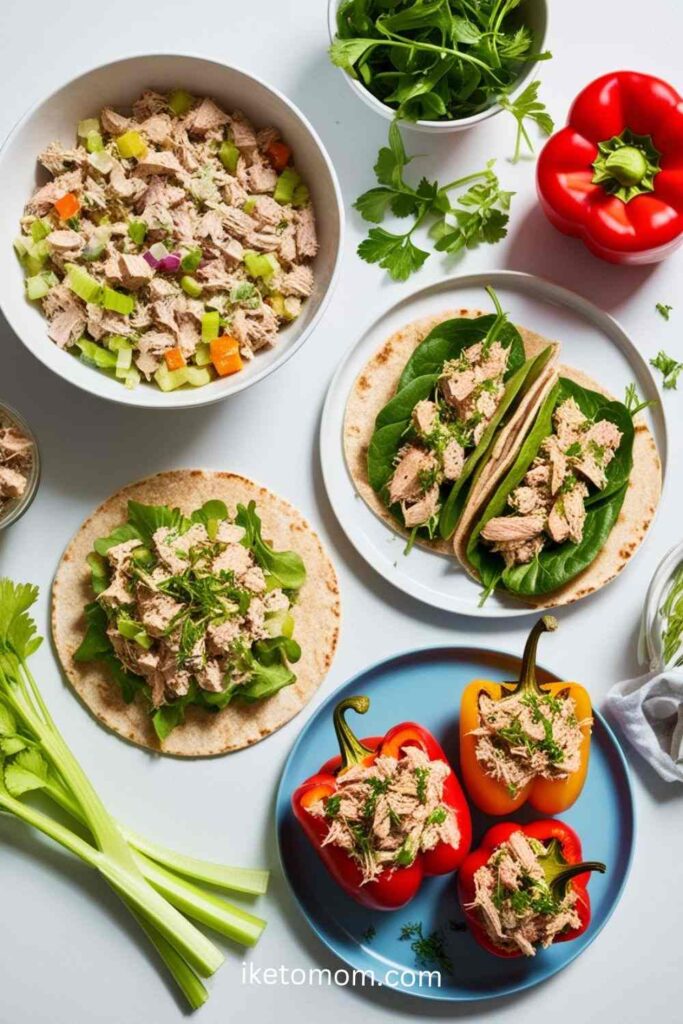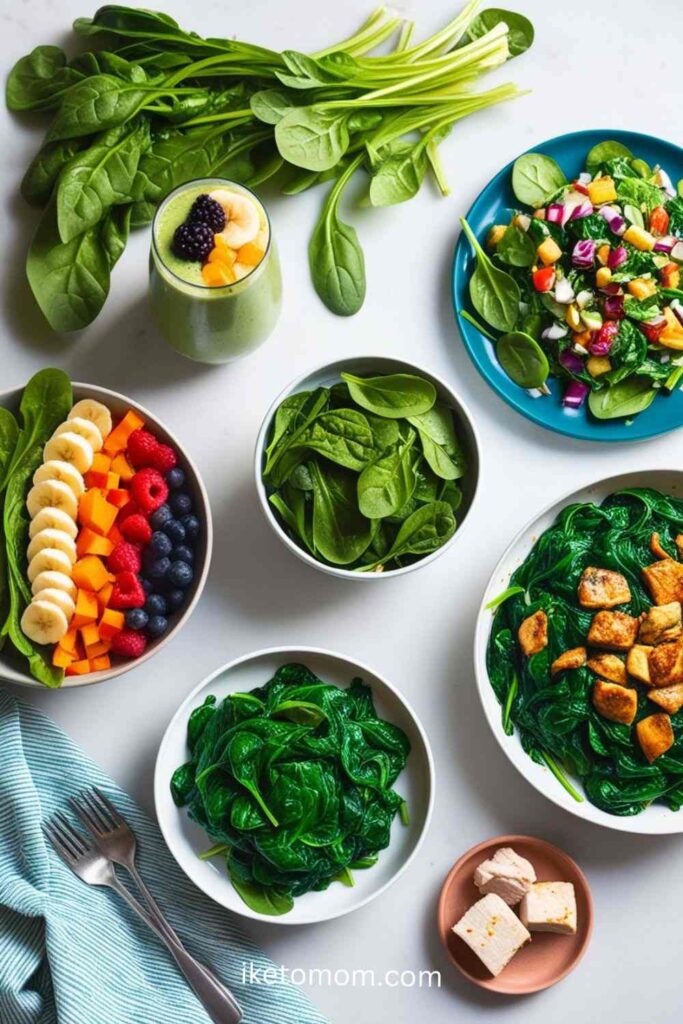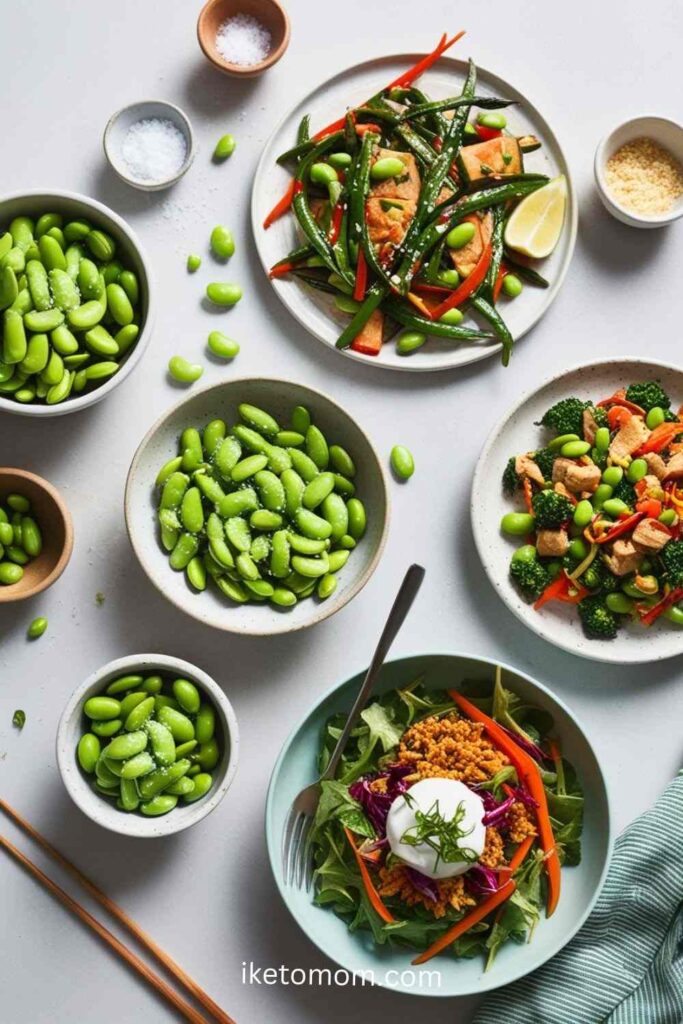High Protein Low Carb Foods Ideas have become a cornerstone of healthy eating, offering numerous benefits for overall wellness. These nutrient-dense options are essential for those aiming to manage their weight, build and maintain muscle, or stabilize their energy levels throughout the day. Protein plays a key role in repairing tissues, producing enzymes, and supporting immune function, while limiting carbs can help regulate blood sugar levels and reduce inflammation.
One of the most appealing aspects of high-protein, low-carb foods is their versatility. They fit seamlessly into various dietary plans, including ketogenic and paleo diets, as well as general healthy eating patterns. Whether you’re meal-prepping for the week, seeking a quick snack, or crafting a gourmet dinner, these foods provide the flexibility and nutrition needed to support your health goals.
Healthy High Protein Low Carb Foods Ideas
1. Eggs
Why They’re Great:
Eggs are a nutritional powerhouse and one of the most complete protein sources available. They contain all nine essential amino acids, making them ideal for muscle repair and growth. Additionally, eggs are rich in vital nutrients like choline, which supports brain health, and antioxidants such as lutein and zeaxanthin, which promote eye health.
Nutrition Information (per large egg):
- Protein: 6g
- Carbs: 0.6g
- Calories: 70
Ideas for Enjoyment:
Eggs are incredibly versatile and can be incorporated into meals or snacks throughout the day. Try:
- Scrambled Eggs: Add vegetables and cheese for a hearty breakfast.
- Omelets: Fill with lean meats, spinach, or mushrooms for a low-carb, high-protein meal.
- Hard-Boiled Eggs: A convenient snack that’s easy to prepare and perfect for on-the-go eating.
Whether you enjoy them as a main dish or a complement to other foods, eggs are a satisfying and nutrient-rich choice for any meal.
2. Chicken Breast
Why They’re Great:
Chicken breast is a staple for anyone seeking a lean, high-protein food with virtually no carbohydrates or excess fat. It’s an excellent choice for building muscle, supporting weight loss, and maintaining overall health. Its mild flavor and tender texture make it a versatile ingredient that pairs well with a wide variety of seasonings and side dishes.
Nutrition Information (per 3 oz cooked):
- Protein: 26g
- Carbs: 0g
- Calories: 140
Ideas for Enjoyment:
- Grilled: Marinate with herbs and spices for a juicy, flavorful protein to serve alongside vegetables or in a grain-free bowl.
- Baked: Season with your favorite rub or glaze and bake for a quick and easy weeknight meal.
- Shredded: Use in salads, low-carb wraps, or soups for a convenient protein boost.
Chicken breast is an incredibly adaptable ingredient that fits into countless meals, making it a must-have for any high-protein, low-carb eating plan.
3. Greek Yogurt (Plain, Nonfat)
Why They’re Great:
Greek yogurt is a fantastic high-protein, low-carb option that also offers numerous health benefits. It’s packed with probiotics, which are beneficial bacteria that support gut health and improve digestion. The thick, creamy texture of Greek yogurt makes it a satisfying and nutrient-rich addition to any diet. Additionally, it’s rich in calcium and other essential nutrients that support bone health.
Nutrition Information (per 6 oz):
- Protein: 15g
- Carbs: 4g
- Calories: 90
Ideas for Enjoyment:
Greek yogurt is incredibly versatile and can be enjoyed in a variety of ways. Try:
- Topped with Berries: Add fresh berries for a sweet, antioxidant-packed snack.
- Mixed with Nuts: For a crunchier snack, mix with a handful of nuts, such as almonds or walnuts, for a dose of healthy fats and additional protein.
Whether eaten on its own or paired with other ingredients, Greek yogurt is a delicious, high-protein, low-carb food that supports both digestive and overall health.
4. Tofu
Why It’s Great:
Tofu is an excellent plant-based protein, perfect for those looking for a low-carb, versatile option that fits into various diets. Made from soybeans, tofu is not only a rich source of protein but also low in calories and carbs, making it ideal for those managing their weight or following a low-carb lifestyle. It’s also a great source of iron and calcium, especially for individuals who don’t consume dairy products.
Nutrition Information (per 3 oz):
- Protein: 8g
- Carbs: 2g
- Calories: 80
Ideas for Enjoyment:
Tofu can be used in a wide variety of dishes, making it an adaptable ingredient for many meals. Try:
- Stir-fries: Cook tofu with your favorite vegetables and low-sodium soy sauce for a flavorful meal.
- Baked Tofu Cubes: Season tofu with herbs and spices, then bake until crispy for a protein-packed snack or topping.
- Tofu Scrambles: Use crumbled tofu to make a savory scramble with vegetables for a plant-based breakfast.
With its ability to absorb flavors and take on different textures, tofu is a fantastic, low-carb protein option that can be enjoyed in countless creative ways.
5. Salmon
Why It’s Great:
Salmon is a top-tier protein source packed with healthy omega-3 fatty acids, which support heart health, reduce inflammation, and improve brain function. In addition to its rich protein content, salmon provides essential nutrients like vitamin D and B vitamins, making it a superfood for overall wellness. Its delicate, flavorful taste and flaky texture make it a delicious choice for any meal.
Nutrition Information (per 3 oz cooked):
- Protein: 22g
- Carbs: 0g
- Calories: 200
Ideas for Enjoyment:
Salmon can be prepared in various ways to suit different tastes and meals. Try:
- Grilled Salmon: A simple, smoky flavor perfect for a summer meal.
- Pan-Seared Salmon: Crispy on the outside, tender on the inside, ideal for a quick dinner.
- Smoked Salmon with Veggies: A light, flavorful option for salads or a protein-packed snack.
Rich in protein and healthy fats, salmon is not only satisfying but also an incredibly nutritious, low-carb food.
6. Almonds
Why They’re Great:
Almonds are a powerhouse of nutrition, packed with protein, fiber, and healthy fats that help support heart health, promote satiety, and provide sustained energy. They are also a great source of vitamin E, magnesium, and antioxidants, making them beneficial for skin health, muscle function, and overall well-being. The combination of healthy fats and protein makes almonds an excellent choice for those following a low-carb diet or trying to maintain steady blood sugar levels.
Nutrition Information (per 1 oz):
- Protein: 6g
- Carbs: 6g
- Calories: 160
Ideas for Enjoyment:
Almonds can be enjoyed in many different forms and incorporated into a variety of dishes. Try:
- Snack: A small handful of almonds makes for a quick, satisfying snack.
- Almond Butter: Spread on toast, mix into smoothies, or use as a dip for fruits and vegetables.
- Salad Topping: Sprinkle sliced almonds over salads for added crunch and nutrition.
Whether eaten whole, as almond butter, or used as a topping, almonds provide a rich source of protein and healthy fats in a convenient and delicious form.
7. Cottage Cheese
Why It’s Great:
Cottage cheese is a fantastic low-carb dairy option that’s packed with protein, making it an ideal choice for muscle repair and growth. It’s also rich in calcium and B vitamins, which support bone health and energy production. Because it’s low in fat and carbs, cottage cheese is an excellent choice for those looking to manage their weight while still getting a high-protein snack or meal.
Nutrition Information (per ½ cup, 2% fat):
- Protein: 14g
- Carbs: 3g
- Calories: 100
Ideas for Enjoyment:
Cottage cheese is incredibly versatile and can be enjoyed in both savory and sweet dishes. Try:
- Mixed with Fruits: Add berries, pineapple, or peaches for a refreshing, nutrient-packed snack.
- Used as a Dip Base: Mix with herbs and spices to create a creamy dip for vegetables or crackers.
Whether served as a snack or incorporated into a larger meal, cottage cheese is a delicious, low-carb protein option that’s perfect for any time of day.
8. Tuna
Why It’s Great:
Tuna is a lean, protein-packed fish that’s low in carbs and incredibly easy to prepare. It’s rich in essential nutrients, including omega-3 fatty acids, which support heart health, and vitamin D, which promotes bone health. Whether fresh or canned, tuna is a convenient and affordable source of protein that can be incorporated into a wide variety of meals, making it a staple for anyone looking to eat healthily.
Nutrition Information (per 3 oz canned in water):
- Protein: 20g
- Carbs: 0g
- Calories: 100
Ideas for Enjoyment:
Tuna can be used in many delicious and quick dishes. Try:
- Tuna Salad: Mix with low-fat mayo or Greek yogurt, and add some fresh veggies for a healthy meal.
- Tuna Wraps: Wrap tuna with leafy greens and your favorite veggies in a low-carb tortilla for a portable lunch.
- Tuna-Stuffed Peppers: Fill bell peppers with a mixture of tuna, herbs, and spices for a satisfying, low-carb dinner.
Tuna’s versatility and nutrient profile make it a perfect addition to any low-carb, high-protein diet.
9. Spinach
Why It’s Great:
Spinach may be low in protein, but its incredible nutrient density makes it an excellent complement to high-protein foods. Packed with vitamins A, C, and K, along with folate and iron, spinach supports overall health, including immune function, bone health, and energy production. Its mild flavor and versatility allow it to pair perfectly with a variety of protein-rich dishes, enhancing the nutritional value of your meals without adding many calories or carbs.
Nutrition Information (per 1 cup raw):
- Protein: 1g
- Carbs: 1g
- Calories: 7
Ideas for Enjoyment:
Spinach can be used in a variety of ways to boost the nutritional profile of meals. Try:
- Smoothies: Blend fresh spinach into smoothies for a nutrient-packed green drink.
- Salads: Combine spinach with other vegetables and a lean protein like chicken or tuna for a refreshing, well-rounded salad.
- Sautés with Protein-Rich Ingredients: Sauté spinach with garlic, olive oil, and add protein like eggs or tofu for a quick, healthy meal.
Although low in protein, spinach is an excellent, low-calorie way to enhance your meals with vitamins, minerals, and antioxidants.
10. Edamame
Why It’s Great:
Edamame, young soybeans, are a fantastic plant-based protein source, offering all nine essential amino acids, making them a complete protein. They’re low in carbs and high in fiber, which makes them a great option for those following a low-carb or plant-based diet. Packed with vitamins, minerals, and antioxidants, edamame also supports overall health, from boosting immune function to promoting heart health.
Nutrition Information (per ½ cup cooked):
- Protein: 9g
- Carbs: 7g
- Calories: 120
Ideas for Enjoyment:
Edamame can be enjoyed in a variety of ways, making it a versatile and nutritious addition to meals. Try:
- As a Snack: Simply steamed and sprinkled with a little sea salt for a quick, satisfying snack.
- In Stir-Fries: Add cooked edamame to vegetable stir-fries for a protein boost.
- In Salads: Toss edamame into salads for extra texture, protein, and a fresh pop of color.
Whether as a snack or incorporated into meals, edamame offers a delicious, nutrient-packed, low-carb way to add plant-based protein to your diet.
FAQ
1. What are high-protein, low-carb foods?
High-protein, low-carb foods are those that provide a significant amount of protein while being low in carbohydrates. These foods are ideal for people looking to build muscle, manage their weight, or follow specific diets like keto or paleo. Examples include eggs, chicken breast, tofu, and fish.
2. Why are high-protein, low-carb foods important?
These foods are essential because they help with muscle repair and growth, provide long-lasting energy, and support fat loss by promoting feelings of fullness. They also help stabilize blood sugar levels, which is especially beneficial for those with insulin resistance or diabetes.
3. Can high-protein, low-carb foods help with weight loss?
Yes, these foods can aid in weight loss by reducing hunger and promoting fat loss while preserving lean muscle mass. The high protein content helps increase feelings of fullness, making it easier to stick to a calorie-controlled diet.
4. Are high-protein, low-carb foods suitable for a keto diet?
Absolutely! High-protein, low-carb foods are a staple of the keto diet. These foods help maintain ketosis, a metabolic state where the body burns fat for fuel instead of carbohydrates.
5. What are some examples of high-protein, low-carb snacks?
Some great high-protein, low-carb snacks include hard-boiled eggs, almonds, Greek yogurt (plain, nonfat), and small portions of lean meats like chicken breast or turkey. You can also try cottage cheese or a small serving of edamame.

I’m Priscilla Swahn, a registered dietitian with a master’s degree in nutritional sciences. With over a decade of experience in holistic nutrition, I specialize in creating delicious keto recipes to help you enjoy a healthy lifestyle. On iKetoMom, you’ll find a variety of recipes for every meal—hearty breakfasts, satisfying lunches, mouthwatering dinners, indulgent desserts, and refreshing drinks. My recipes make keto living easy and enjoyable for the whole family. Featured in EatingWell and MindBodyGreen, I also collaborate with health centers and corporate companies to share my expertise. Join me and discover the joy of keto cooking!

